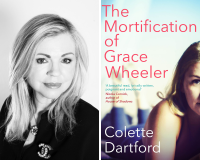
Publishing needs JK Rowling to be a monster
thecritic.co.uk – Wednesday September 7, 2022

The trouble with JK Rowling is that she has done nothing wrong. Back in 2020, she wrote a carefully worded, compassionate piece about sex and gender. It’s here if you want to read it.
In it, she described “a climate of fear that serves nobody – least of all trans youth – well”. At no point did she express the even mildest disapproval of gender non-conformity, let alone call for “trans genocide”. “Trans people,” she wrote, “need and deserve protection […] I feel nothing but empathy and solidarity with trans women who’ve been abused by men.”
The response to this piece was obscene. Some of it’s here if you want to read it. I am aware, however, that checking original source material is not the done thing when it comes to having an opinion on Rowling.
Shortly after the publication of her blogpost, countless op-eds appeared explaining what Rowling “really” meant. To summarise them all, Rowling was lying about not hating trans people and wanting them dead, and you could tell this by the fact she said she didn’t hate trans people and didn’t want them dead.

So you want to write a bestseller? Try these top tips
smh.com.au – Sunday September 4, 2022

Everyone, they say, has a book in them. But where do you start? With the Melbourne Writers Festival about to open, we asked leading authors to give their tips on how to create a literary triumph.
Fiction: C.S. Pacat
Write the book that you want to read. This is a cliche, but few people actually do it. Imagine that you are walking into a bookshop or a library. There is a book you are looking for but never find. The reason you never find it is that this book doesn’t exist on the shelves. This book exists only within you.
This is the book you must write. You will know some things about it instinctively. Imagine yourself searching for it seriously. Close your eyes. You know what genre it is. You know how you want it to make you feel. Write those things down. Do you know anything more? The type of characters it might have? The setting? The type of journey it takes you on?

Five Steps to Writing a Crime Novel Inspired by Your Family (Without Making Everyone Hate You)
crimereads.com – Saturday September 3, 2022

“Write what you know.” It’s the second-oldest piece of writing advice there is, right behind “show, don’t tell.” There’s a long rich history of authors weaving details of their personal lives into stories, to varying degrees and with varying regard for subtlety. There are full-on roman à clefs. Protagonists who just happen to be depressed, struggling authors. Stephen King books set in Maine.
It’s an old piece of advice because it works. The more you pull from real firsthand experiences, the more your writing feels… real. Revelatory stuff, I know. But pulling from life can get complicated in a darker genre like crime. At least horror authors like King can mask their real-life inspirations with the supernatural and over-the-top: ex-lovers transform into vampires; a cocaine addiction becomes a rabid dog (in Maine) or a deranged fan (of an author); grief is an Indian burial ground. Crime offers no such crutch. The genre is too grounded in real life for us to mask much, if anything. The way I see it, crime fiction equals horror plus realism. Every character is human and usually irredeemably flawed, even the good guys.
What I’m getting at is that writing a crime novel is a uniquely great way to piss off the real people you end up writing about. Especially if they’re family. And what else is a young, inexperienced author supposed to write credibly about?

Elisa Gabbert on Writing and Capturing Beginner’s Luck
lithub.com – Saturday September 3, 2022

For a period in the late 2010s, I had the good fortune of belonging to a regular poker game. Whenever someone new would join us, confessing they didn’t really know how to play, my friend Mike and I would tell them, “That means you’re going to win.” And they always did.
Beginner’s luck is real. Poker always depends on luck, but there’s something else, beneath the luck, that feeds the luck, a root system. Beginners aren’t afraid. They have no performance anxiety, because they have nothing to live up to. They don’t know the other players’ habits, so they have no distracting expectations. And they’re not afraid of their own cards, whether they’re especially good or bad, because they don’t know how good or bad their cards are; they have no internalized sense of the odds. They’re unafraid out of ignorance—you might say, unafraid for the wrong reasons—but fearlessness is still an advantage, and it’s a skill you have to relearn. Most players, after their beginner’s luck runs out, stay mediocre because they never do.
People say “Trust the process,” but I’ve found there’s a danger in trusting my writing process too much. Once a process becomes fully routinized, I’m not learning anything. I know I can write a short literary essay—what a friend of mine calls an “I noticed a thing” essay—of a thousand or so words. I wrote a book of those. I know I can write a research-based essay of about four thousand words, generally in three sections—almost three subsequent essays that become a super-essay. I wrote a book of those too. I know there’s a certain amount of material, mostly books and other writing, I can consume to have enough interesting thoughts to build an essay around. I didn’t always know that—I had to try and succeed many times in a row first. (The only measure of success: I liked the effect.)

How do you know if your writing is considered “literary fiction”?
authorlink.com – Thursday September 1, 2022

Generally, genre or category fiction is more plot-driven, while literary fiction is more character-driven. In either case, the story needs an arc or shape. However, I think of commercial or category fiction as being driven largely by action than by the character’s introspection. In literary fiction one usually finds more detail about how each character thinks and feels as it relates to the storyline. I’d be interested to know how others define the difference.
Wikipedia defines it this way:

Six Things I've Learned About Writing In My Sixties
crimereads.com – Wednesday August 31, 2022

I’ve been writing all my life but for most of it, it was a secret indulgence, like swimming naked in the sea at night or eating chocolate belonging to my children. Most people who knew me didn’t realise that I wrote, and wouldn’t have been interested if they had. I wrote snippets here and there, short stories and even shorter things that didn’t even warrant the title ‘story’. Observations, notes for characters, there was no pattern to it and no discipline. I had five children and when they were little they slept in a crib on wheels. I could rock the crib with my foot while I lay on the bed propped on my elbow, scribbling in an exercise book.
Guess what, those children grew up! They didn’t fit in the crib any more and I had a bit more space in my life, so I joined a writing class and we formed a group. This was so important to me in those early writing years. Actually reading my work out, getting a response, knowing I’d made someone laugh or cry – they were the best feelings ever. My stories started to get longer and longer in response. Somewhere along the way I gained a Master’s degree in creative writing. I made some good friends but got distracted from writing novels, which was what I really wanted to do.

How Woke Put Paid to Publishing
city-journal.org – Monday August 29, 2022

News that Salman Rushdie had been stabbed on stage at a New York literary festival shocked the world. It prompted an outpouring of sympathy for the author, who has spent more than 30 years with a fatwa placed on his life. Amid concern for Rushdie’s health, some have begun to ask whether The Satanic Verses, his 1988 novel accused of blasphemy against Islam, could even be published today.
It’s not an unreasonable question. Attitudes toward free speech, blasphemy, and Islam have all changed considerably over the last three decades. Horrific crimes such as the murder of journalists at the French publication Charlie Hebdo in 2015 still prompt support for press freedom. But it took precisely two days for some to suggest that #JeSuisCharlie solidarity would “play into the hands of the racists and fascists.” Rare is the defense of free speech that comes without caveats: free speech, but not for racists or Islamophobes; but not without consequences; but not the liberty to say things that I, personally, find offensive.
The upshot is that many who work in journalism, universities, or publishing are now more concerned to avoid offending than to test the limits of what can be said. In this context, arguing for free speech often arouses suspicion. Defenders are said to be aligned with racists, transphobes, deplorables. And no one wants that. Rather than publish and be damned, the message is to self-censor in line with fashionable woke values, or risk being cancelled. How has this happened?

Five dos and five don’ts of writing (or how to get ahead in the literary world)
irishtimes.com – Thursday August 25, 2022

Do think about your legacy A great many female writers have been ‘reclaimed’ in the past few years, but God forbid that ever happens to me. Reclamation is like having your corpse exhumed by an academic for forensic purposes. To avoid this, I plan to keep publishing in perpetuity. I’ve already given the Linenhall Library a novel to be released after my death on January 1st, 2070 – save the date!
Don’t fall prey to those sombre enemies of art that can distract you at every turn These days, it’s not the pram in the hall that will prevent you, but the phone in the pocket, the Google on the PC, the beeping text or Twitter. To paraphrase the Timothy Leary sixties anthem, ‘Turn off, tune out, log out’. Don’t waste your time tweeting because it’s not like a literary letter and no one’s going to publish your Collected Tweets Vols I and II. Twitter is more ephemeral than a mayfly’s breath. Instead, live the literary dream and exude writing: breathe it, bleed it, breed it, even eat it. For instance, if you come to my house tonight, I’ll be serving Flan O’Brien for starters, followed by Irish Stew-art Parker, topped off with Donna Tartt and custard.

What Five Years with a Predatory Vanity Press Taught Me About Art and Success
lithub.com – Tuesday August 23, 2022

Every few months, I receive an email or phone call from someone who claims to work for a literary agency or publishing entity. In the lengthy messages variegated with bold-faced sentences, or voicemails in which the speaker mispronounces my maiden name, I’m promised six-figure book deals with Simon & Schuster or Penguin Random House (“Yes, mmhmm that’s correct, Penguin,” one woman repeated in her message). I’m told that I will be represented to their network of mainstream filmmakers and that authors who have “partnered” with these publishers or agents have been New York Times and USA Today Bestsellers.
But these messages have nothing to do with the novel I’m actively querying. Instead, I’m told that a book I wrote as a teenager, self-published through an extinct vanity press and now buried in the library of obscure titles on Amazon, is the reason for their interest.
When I was seventeen, I sent the first book of a YA fantasy series to a publishing company I found through a Google search. The website had an ad video from Miss Oklahoma, vouching for the integrity and Christian principles of the press. My mom answered the phone when they called one afternoon of my senior year. The acquisitions editor told her my book had great potential and promised a full-scale publishing deal and marketing campaign. She failed to mention any expenses on our part, instead dropping the sum of $30,000, the amount the publisher would commit to me. She guaranteed my book’s success. When my mom rushed to tell me, we could barely contain our disbelief and excitement until my dad got home.
I remember his words for it: “It almost seems too good to be true.”

Colette Dartford on writing believable characters
culturefly.co.uk – Saturday August 20, 2022

As a reader I have a hundred-page rule, which means that if I’m indifferent to the main characters and what may become of them at that point, I don’t read any further. Some people find this heretical (two members of my book club, for example) but honestly, what’s the point? There are so many wonderful novels out there, and with so little free time, I feel entirely justified cutting my losses and moving on.
It’s quite a different matter, however, when I look at it from the other side, as a writer. Then I am acutely aware that the characters I create must be complex but believable, flawed but likeable, unpredictable but relatable. Not so easy now, I tell myself, staring at my laptop screen, longing for inspiration. The namesake of my latest novel, The Mortification Of Grace Wheeler, is a case in point. Grace is conventional, undemanding, not one to make a fuss. The danger in writing such a character is that initially they may come across as dull and uninteresting. My task is to peel back the layers of her apparent ordinariness and expose the contradictions that swirl beneath. For example, Grace’s husband, Cal, is much older than her and the age gap has become a gaping chasm. A lifelong Tory who voted for Brexit, she considers him staid and old-fashioned, yet when their son introduces his first girlfriend, an exotic creature with multi-coloured hair, a nose stud and tattoos, it is Grace who is quietly shocked and disapproving. Cal finds her an absolute hoot. Similarly, having been raised by a devoted single mother who often struggled to make ends meet, Grace prizes the stability of her twenty-year marriage and the security of her modest but comfortable home.
Get the free newsletter | Submit a news item or article | Get Writers' News for your website





